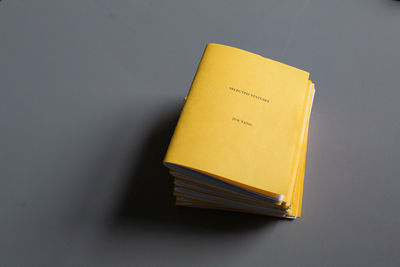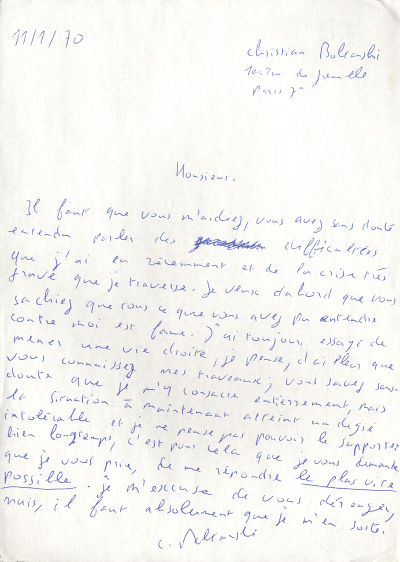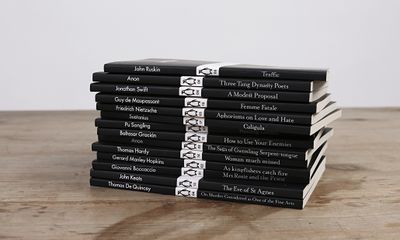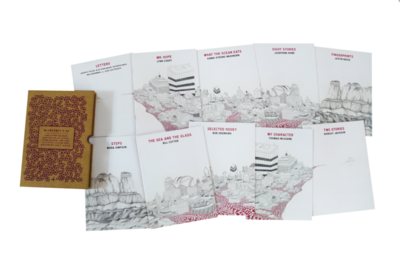Jujube/thesis-drafts
thesis proposal
My thesis is a collection of writing and a photo book serving as its index. They will be printed and bound into small zines (A6 or similar).
I am guided by the following questions throughout my time at PZI. Some of the questions occurred during this period of practice-based research. Others predate the Master's, but have received new light as I learned to investigate and practice with focus.
- How does the image lead to empathy? Why do I care about empathy?
- How and why am I making films in my practice?
- When I want to evoke a feeling, what feeling is that? Why is that important?
The corresponding keywords are:
- narrative, emotions, emotional intelligence, self-knowledge
- photography, the moving image, writing (the image), medium
- solitude, loneliness, spiritual diaspora, phenomenology, trancendance
The writings will take the form of creative non-fiction, written in the fashion of personal memoir. They consist of:
- My text on practice [1],
- An essay on the evolution of my artistic practice ("Why I Write")
- An essay on memory and image-making ("The Confession of a Memoirist")
- An essay on narrative, drama and image-making ("The Tiniest Feeling in the World")
- Annotated Bibliography
This list (and most probably the titles) might change; some of the essays might be combined into one. I will use the annotated bibliography as a document that demonstrate the qualities of a thesis according to the handbook.
References
Form & concept
Selected Statuses. A zine I made during the first year consisting of 50 selected status updates that I posted on Facebook from 2013-2018.
Christian Boltanski: Reconstitution [2]. "Heavy brown cardboard box with title printed in black on label pasted to lid, containing 18 items."
From the handbook
The thesis should show:
- evidence of a clearly structured analysis and argument
- use of relevant source material and references
- clarity of writing
- attention to alternate arguments and sources
- ability to research texts and practices and reflect upon them analytically
- ability to manage ‘interdisciplinary’ material
- clear referencing according to the Harvard system
- ability to position ones own views within a broader context
Photobook as the index
- a plastic bag with Chinese label
- sketching a room: a series
- still from Scene 1
TBC
Why I Write
1.
My mom finally mailed me a box of stuff, which she picked out from what I had mailed her from the US the year before. She said she couldn't include the knives. Apparently the government had banned the mailing of sharp objects, which meant my immersion blender didn't make it, either.
My mom sent the box from China. I knew she packed it because I found two plastic bags with the Chinese label, "Bei Yi Department Store." She worked there for more than twenty years before retiring at the age of fifty. I recognized my dad's handwriting on the mailing label. In the field for "detailed description of contents," he wrote — in Chinese characters and then, using the same squarish strokes, English letters — "Clothes" and "Books".
He declared their worth: 1500 US Dollars.
Inside the box I found, besides the few books and shirts, two hiking maps from National Geographic and a knitted grocery bag I got in Oaxaca.
I suppose my dad understood the value of these things by putting down a number eleven times higher than the monies I'd paid for them.
I ordered Letters to a Young Poet by Rainer Maria Rilke the day my college architecture advisor told me to read it. It had lived in an Amazon warehouse, a basement in Vermont, three houses in Washington DC, one apartment in New York, a storage in New Jersey. It stayed on, unlike many of its contemporaries that were given away or, somewhat carelessly, discarded throughout the moves — until it was packed into a USPS parcel from Brooklyn to Shanghai, where it lived among old documents, and packed again into a cardboard box to Rotterdam.
I have placed it in my living room.
"My dad wanted me to be a lawyer," my advisor said, "as an English major, I thought architecture would be the middle ground." I also remember him saying: the present things are clear while the past trickles away as he pressed his fingers together and made a gesture towards something far.
My first ever summer fling used one of Rilke's quotes as his email signature. I was never quite sure why he had chosen that line, "everything is gestation towards birth."
I wrote — had been writing — because I depended on it.
If I didn't write, the unsaid words would weigh in my limbs and my chest; I would collapse and burst into a pool of flames.
Things became true when I wrote. The tip of the pen touched the paper, casting thoughts into form. I used to write under a lamp, watching the ink absorbed by the paper with every twist and turns from my hand. I would often got used to a pen and felt uneasy when switching to a new one, which seemed too thick, too smooth, too shiny, too fine.
I wrote, but for the longest time I couldn't say I was a writer. Writing was then a private affair. When I eventually found ways to share I would only share a small portion of what I wrote. From the outside they resembled riddles, poetry and sarcasm.
There was a distance between me and me, and therefore, there was a distance between me and the world.
2.
When I was 17 or 18, before going to the US, I wrote a letter to myself. Around that time I was enamored by Stefan Zweig, an Austrian Jewish writer most prolific during the 1920's. I bought all the books I could find under his name, thinking one day I would learn German just to read his works in their original language.
There is one line from that letter that I revisit ever so often, my mind's eye watching my moving hand.
"One day I will be an author."
3.
I wrote in Chinese for all those years.
I don't remember when exactly I stopped doing that.
4.
Four short stories filled with inner monologues:
A woman waiting for her flight to a Thanksgiving dinner.
A woman losing her favorite color.
A woman afraid of the color green.
A factory worker unable to find a stone from his pocket.
images
The first time I saw a dandelion I was twenty years old.
--
--
--
"Being here is a demarcation of time," I wrote that in September, 2018.
I wanted to make a speech about the physical and internal turmoil, some of which I endured and some of which I inflicted on myself. But I didn't. Instead I showed some works from the past. The first website I made, the last website I made. A series of photos. A snapshot of a play script.
key texts
feelings
- Jujube/synopsis#United_by_Feelings
- Jujube/synopsis#Feelings.2C_Emotion.2C_Affect
- Jujube/synopsis#David_S._Miall:_Emotions_and_the_Structuring_of_Narrative_Responses
I want to evoke feelings. I believe it is shared human nature and thus a way to foster empathy. Empathy comes from compassion (understanding and love) for the self.
I can now say this, with certainty and humility, that I want to surround myself with understanding and thus create a world where people understand each other. If you see me in you, and if I see you in me, perhaps the world will suffer less.
A few people whose judgement I trust have told me, "nobody can ever understand you in totality," which I have come to agree. In trying to be understood, I finally become able to understand myself. And that's where I connect self-compassion and empathy.
memories
- Jujube/synopsis#Siegfried_Kracauer:_Memory_Images.2C_1927
- Jujube/abstracts-non-text#Play:_salt <--a one-woman play instead of text
Memories are images strung together. Words construct images — words come to me via memories.
A few people told me that my writing touches or bring to mind images.
That's how poetry works, I suppose.
I want others to understand, through these images, something about me, something about themselves.
the making of images without language
"A film is a story or a proposition... that is shaped, angled, finite, intended, whether it is a documentary, an art installation, a bit of gritty realism, or a full-blown fantasy... A film-maker is a person who makes such things."
I encountered the camera not through intention, but chance.
If you ask, "why the camera," I would say:
I took a chance. I connected the dots from my past. I was curious.
And I have been privileged to stay with it, hold it, test it. I have become decisive and considerate with its help — I am an ally, and more importantly, a student.
"And why film?"
I discovered time through film. I unearthed my intention about image-making. In writing and in making films I am drawing a very, very large circle, some sort of infinity that help me understand my being in this world.
I ask more concrete questions through the things I make:
Do narrative and personal memory ever come together? Is that the form of the Memoir? Or Must one become fictionalized?
How to evoke the sense from memory? (Is this a how question?)
Or, if I want to evoke feeling, should I construct a story around it?
causality, narrative, dramatic logic
Causality is important in determining narrative. Different time periods (cultures) tend to favor different causality. (Perpetuations of the unhealty, unresolved kind seem irresponsible.)
Narrative, in the dramatic sense, follows dramaturgy.




